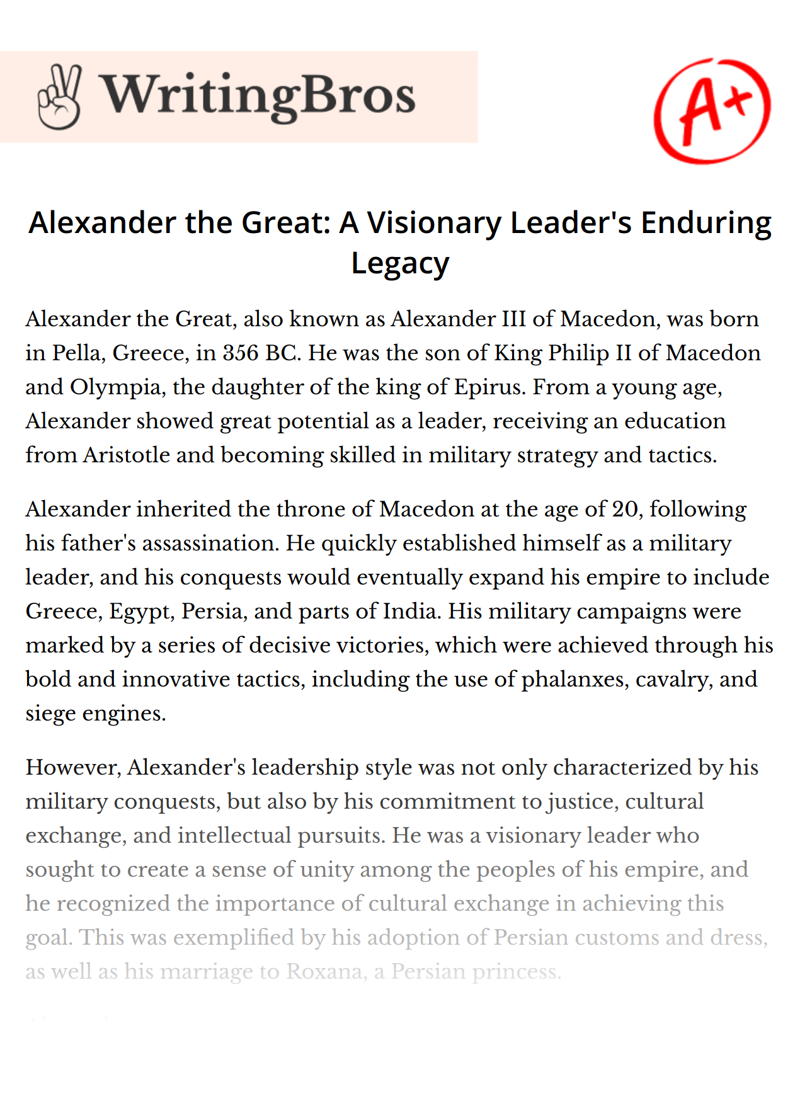Alexander the Great: A Visionary Leader's Enduring Legacy

Alexander the Great, also known as Alexander III of Macedon, was born in Pella, Greece, in 356 BC. He was the son of King Philip II of Macedon and Olympia, the daughter of the king of Epirus. From a young age, Alexander showed great potential as a leader, receiving an education from Aristotle and becoming skilled in military strategy and tactics.
Alexander inherited the throne of Macedon at the age of 20, following his father's assassination. He quickly established himself as a military leader, and his conquests would eventually expand his empire to include Greece, Egypt, Persia, and parts of India. His military campaigns were marked by a series of decisive victories, which were achieved through his bold and innovative tactics, including the use of phalanxes, cavalry, and siege engines.
However, Alexander's leadership style was not only characterized by his military conquests, but also by his commitment to justice, cultural exchange, and intellectual pursuits. He was a visionary leader who sought to create a sense of unity among the peoples of his empire, and he recognized the importance of cultural exchange in achieving this goal. This was exemplified by his adoption of Persian customs and dress, as well as his marriage to Roxana, a Persian princess.
Alexander was also committed to justice and fairness, both for his soldiers and the people of his empire. He was known for his generosity towards his soldiers, providing them with better pay and living conditions than they had received under previous Macedonian kings. He also encouraged the growth of cities and the arts, and he supported the education of young people.
Alexander's commitment to intellectual pursuits was also a defining characteristic of his leadership style. He was an avid reader and was particularly interested in philosophy and literature. He carried a copy of Homer's Iliad with him on his campaigns, and he sought out the company of scholars and thinkers. This intellectual curiosity helped to shape his worldview and his approach to leadership.
Perhaps one of the most significant aspects of Alexander's legacy is his impact on the spread of Hellenic culture. Through his conquests, he brought Greek culture and ideas to the lands he conquered, and he encouraged the exchange of ideas between different cultures. This helped to create a sense of unity and cooperation among the peoples of his empire, and it laid the groundwork for the development of Hellenistic culture.
Alexander's legacy as a leader continues to inspire and influence people today. His commitment to justice, cultural exchange, and intellectual pursuits remains as relevant now as it was in his time. In a world where global cooperation and understanding are more critical than ever, Alexander's approach to leadership serves as a reminder of the importance of cross-cultural exchange and the pursuit of knowledge. His legacy as a visionary leader and military strategist continues to be studied and admired, and his impact on the course of history cannot be overstated.
Cite this Essay
To export a reference to this article please select a referencing style below

